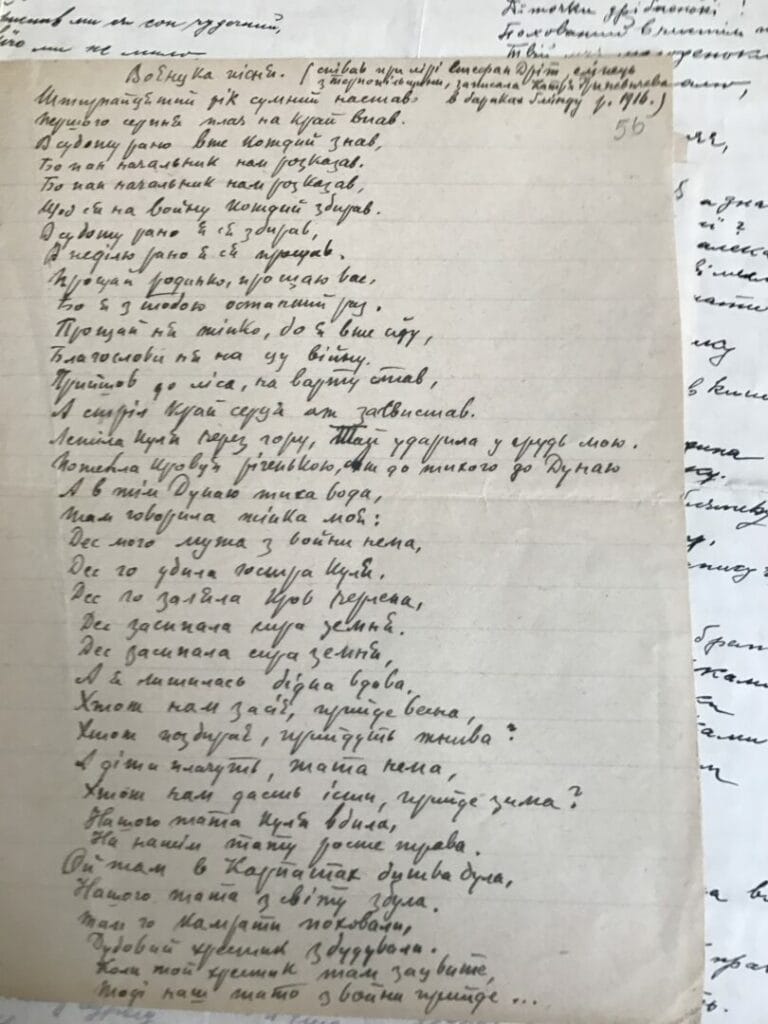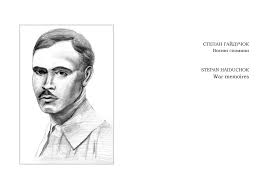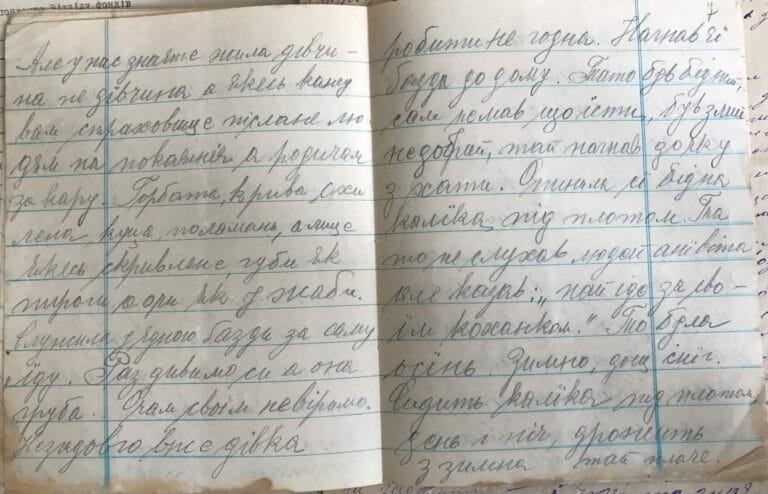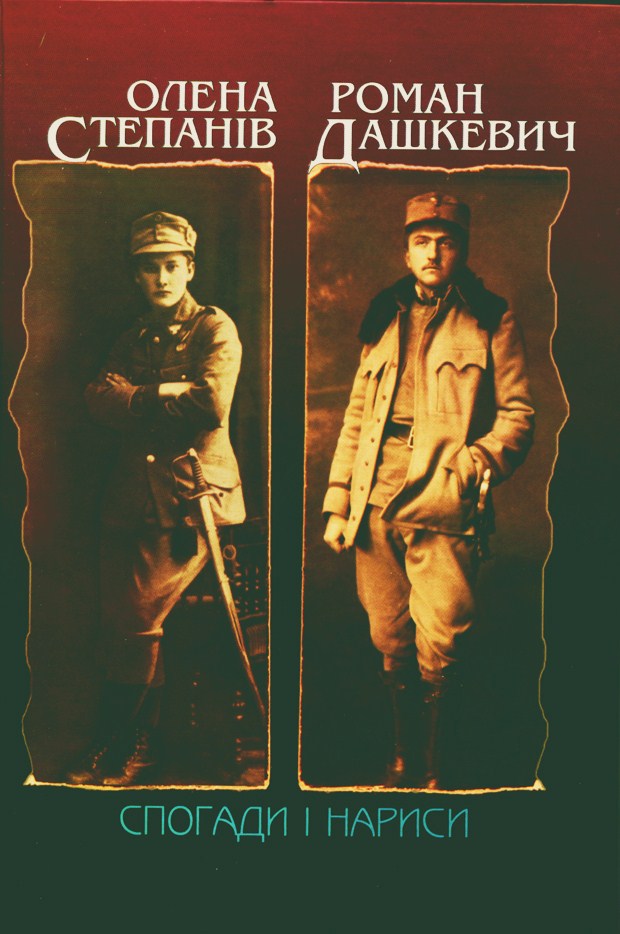My Medic’s Experience
South-East Ukrainian Army was in a dire situation at those times. Back in January, 1918, following the headman’s Zelenyi uprising in Kyiv area, the northern flank of the Ukrainian front was cut off the southern flank. In April, the so called Bolshevick’s offensive on Zhmerynka cut off the southern group from the main troops of the Army of the UPR.
Before that, the Army had had many wounded soldiers and those infected with typhoid that started spreading among civilians. In the beginning, sanitary trains took the most seriously ill patients to Kamyanets-Podilskyi, but they kept being blocked increasingly more often. Thus, eventually, the South-East Army was left without sanitary trains. All hospitals were so overcrowded that the patients were lying side by side on the floor, and they could not get the necessary care. Our unit also had the wounded soldiers and the typhoid patients. We had nothing to help them but we could not leave them, either. That is why we took them along.
In order to address that disaster that was drastically growing, I took courage to talk to the commandant of the South-East Army, Janiv. At that time, their command was stationed at Birzula station. There I went. Headman Janiv listened to me carefully and suggested I organized the sanitary train. There were no medications, equipment, doctors, or nurses available at all. As to my training in this area, it only included a rather general knowledge acquired during the short medical nurse course I took back at home. I have not had any practical experience. Moreover, I was quite young to be able to manage such an endeavor on my own. After I explained it all to the commandant, he answered point-blank that it was not a suggestion but the order that a member of the military cannot reject.
The headman immediately gave me a document authorizing me to take any appropriate train carriage if it passed the Birzula station. That task was far from being easy. It was hard to predict when any such carriages get there. It was difficult to find them. I literally had to fight for each carriage. Those were usually the command staff carriages who were ardently protesting against the confiscation. They obviously ignored the fact that each of them might need such carriage overnight to receive medical care. Gradually, I managed to put together the sanitary train; I even procured a carriage with the bath.
Nevertheless, in addition to carriages, we also needed other supplies, such as bedsheets, wound dressing, medication, underwear, and at least some staff. After certain time and effort, I received several privates to help me, although they had no idea about those new functions. What is more, they were sick, and fit neither for combat, nor for any other work. With little experience myself, I had to train them to be nurse attendants.
Our train quickly filled with patients. In addition, in night time, we had to travel with individual carriages to the front to pick up the wounded. We often came under fire but somehow, we always managed to return to Birzula and bring the most severely injured there.
Fortunately, at that time, I was still fit and strong to easily pick up a patient and carry them from one place to another. However, the constant excessive fatigue started disrupting my strength. I could hardly think of more than two or three hours of sleep. In fact, the work never ended. Once, when I took a minute to sit down at a table and have some rest, I leaned on it, put my head on my arms, and dropped off. There was a candle on the table. Possibly because I was half-conscious from fatigue, I must have pushed the candle, and it rolled and fell. In a minute, the smoke and fumes woke me up but the window curtains and my clothes had already been on fire. To avoid any panic, I put down the fire myself. No one has ever learnt about that accident. But eventually, I myself requested to give more people to help. I have not shown my burnt arms to anyone but it took long to heal.
I managed to ask for some bedsheets and underwear from the detachments that still had some in stock. However, we were in constant shortage of medications and dressing material. It made our work more difficult, and aggravated the recovery for patients. It is clear that patients asked and demanded for medications, pills, or drops, but at some points, we literally had nothing to offer. To provide some moral support to the patients, we sometimes had to deceive them like kids. Once, we managed to get some stock of natron, the white alkali. We divided it into small doses, and would give them to patients when we had nothing else to offer. Most of them were happy about it, and they believed it helped. They were joyful and felt better. Obviously, the powder did not help for wounds or typhoid but it was true that the suggestion helped keep up the spirits, which subsequently contributed to faster recovery of the body.
Recovery process was not easy, either. But we tried to manage the situation. In that context, when patients generally had weak immunity, they would often develop gangrene. Then, urgent surgery was needed but we had nobody to perform it. Then, we took such patients as far as to the Red Cross hospital in Zhmerynka.
Then, came the spring of 1919. It’s been several months. Over this time, I managed to treat many patients, and gain much experience of that hard work. Unfortunately, all my work suddenly went wasted. There came a doctor who probably badly needed to get to Mykolaiv but there was no way to go there. He started telling us about Odesa as a neutral city under the supervision of the Entente. He said we had to transfer the patients there because they will be taken care of. It was true that Odesa actually had the French landing force stationed but their position was shaky. During our trips, I had certain updates about the situation in Odesa. That is why I had some definitive reasons not to believe the tempting promises. However, the doctor’s words were more convincing. The command staff gave in and they assigned me to take the wounded there, together with that doctor. While still keeping my critical thinking, I refused point blank. As a result, the entire train was re-assigned to that doctor. Hoping that the train is immediately coming back, headman Janiv and several other captains went along, expecting to settle important affairs there. Unfortunately, my suspicions came true. On April, 6, the French landing force withdrew from Odesa, under the attack of the headman Grygoriev. This way, they opened the access to him, and further to Bolshevicks. Not only had our sanitary train not returned, but Janiv was caught by Bolshevicks, and they shot him. Two captains only managed to break free. As to the wounded patients, I have never learnt about what happened to them. I still feel the pain when thinking of the possible outcome for those poor things.
I was deeply affected by that failure, and I did not know what to do in Birzula, feeling restless. I started thinking of returning to Bohun regiment where I had been involved in its establishment, and people knew me there. At that time, though, the assistant of headman Bozhko from Zaporizka Sich, Shylo, came to Birzula. Several captains came with him, too. As soon as he learned about that incident with the sanitary train, and that I had not followed it, he immediately found me and offered to transfer to the Sich that had nobody to care for the sick. Besides, there was nobody who would admit a woman in the Sich but in that context nobody treated me like a woman. Although I really wanted to return to Bohun regiment, I realized that I was needed more here, and there was no one to work. That is why I agreed. So, I went to another duty.
Sich was located not far from Birzula, and there were many people from Katerynoslav. I was given another assignment to organize sanitary train 37. It was much smaller than the first one but not less important. I had to receive the wounded from several other units that did not have the medical care available. We were stationed on Rozdilnia station. The conditions were getting more and more difficult. The epidemic of spotted fever spread fast, and the heavy battles were getting closer to Rozdilnia. Our group was cut off the main army units and we were surrounded. Therefore, we had no other choice but to retreat towards Romania. The negotiations started with the Romanian side to get the authorization to cross their territory.
At the same time, I caught the typhoid. There was no one to replace me, and I still had to dress the wounds of the patients, being feverish myself. To be true, I reported to the commandant (at that time, it was headman Volokh) that if I continued to work, I could infect the wounded patients. But he could not take that into consideration under the available conditions. On our way through the incessant hostilities approaching Rozdilnia, we were receiving increasingly more wounded soldiers. They kept bringing them from all over, whether we could manage them or not. There was a case when they brought the casualties from the Zaporizhzhia Corps of the Southern Group and threatened to shoot us if we reject them. It is no wonder that the commandant told me there was no choice and we had to continue to work, regardless of my health condition.
I realized the danger of the situation and the threats to our wounded people if we had not evacuated them from that dead end, and they could have been caught by Bolshevicks who would have cruelly tortured them. That is why I tried my best to continue, although with the high fever. At that time, people did not fear death. I was more motivated by the need to evacuate those suffering fellows. And there was a shortage of railway cars because the available carriages were used for supplies. With the fever above 40 degrees, I addressed the Command for the last time. I said that the supplies would fall into the wrong hands whereas we need to evacuate people, as a priority. The awareness of the deliberate crime would always on our conscience if leave the wounded there at their peril.
Headman Volokh then issued an order to have one of his aides to accompany me and go to see the traffic chief. They gave as the steam engine that transported the entire sanitary train to the main track and sent us as a priority towards Chisinau. At that time, my disease aggravated, so that as soon as the train set out, I fainted. I am not sure how long I stayed there. I regained myself on Easter 1919, when the nurse brought me two painted Easter eggs and greeted me with the touching “The Christ Has Risen!”
We were staying on the quarantine in Chisinau, on the Romanian territory. After that day, I can remember everything. I was extremely weak but tried to get up as soon as possible. That’s when I learnt that the relocated supplies had been confiscated by Romanians, and we really needed them. However, everyone supported me that we needed to prioritize people rather than the supplies. After some obstacles, we crossed Romania towards Halychyna. We stayed for some time in Zalishchyyky, for a break, and then followed across Ternopil towards Zbruch. It was late May, 1919.






Memoirs of Kharytyna Pekarchuk – corporal of the Army of the Ukrainian People’s Republic, the first woman to receive a Ukrainian state award in the 20th century (token of the Order of the Iron Cross No. 1, Cross of Symon Petliura). The passage refers to her medical service during 1918-1919. The memoirs were published in 1969 in the Ukrainian magazine in USA, Nashe Zhyttia (Our Life) by the Union of Ukrainian Women of America.